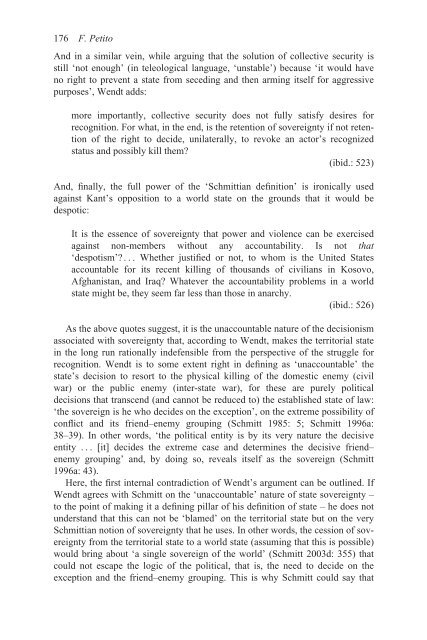The International Political Thought of Carl Schmitt: Terror, Liberal ...
The International Political Thought of Carl Schmitt: Terror, Liberal ...
The International Political Thought of Carl Schmitt: Terror, Liberal ...
You also want an ePaper? Increase the reach of your titles
YUMPU automatically turns print PDFs into web optimized ePapers that Google loves.
176 F. Petito<br />
And in a similar vein, while arguing that the solution <strong>of</strong> collective security is<br />
still ‘not enough’ (in teleological language, ‘unstable’) because ‘it would have<br />
no right to prevent a state from seceding and then arming itself for aggressive<br />
purposes’, Wendt adds:<br />
more importantly, collective security does not fully satisfy desires for<br />
recognition. For what, in the end, is the retention <strong>of</strong> sovereignty if not retention<br />
<strong>of</strong> the right to decide, unilaterally, to revoke an actor’s recognized<br />
status and possibly kill them?<br />
(ibid.: 523)<br />
And, finally, the full power <strong>of</strong> the ‘<strong>Schmitt</strong>ian definition’ is ironically used<br />
against Kant’s opposition to a world state on the grounds that it would be<br />
despotic:<br />
It is the essence <strong>of</strong> sovereignty that power and violence can be exercised<br />
against non-members without any accountability. Is not that<br />
‘despotism’?. . . Whether justified or not, to whom is the United States<br />
accountable for its recent killing <strong>of</strong> thousands <strong>of</strong> civilians in Kosovo,<br />
Afghanistan, and Iraq? Whatever the accountability problems in a world<br />
state might be, they seem far less than those in anarchy.<br />
(ibid.: 526)<br />
As the above quotes suggest, it is the unaccountable nature <strong>of</strong> the decisionism<br />
associated with sovereignty that, according to Wendt, makes the territorial state<br />
in the long run rationally indefensible from the perspective <strong>of</strong> the struggle for<br />
recognition. Wendt is to some extent right in defining as ‘unaccountable’ the<br />
state’s decision to resort to the physical killing <strong>of</strong> the domestic enemy (civil<br />
war) or the public enemy (inter-state war), for these are purely political<br />
decisions that transcend (and cannot be reduced to) the established state <strong>of</strong> law:<br />
‘the sovereign is he who decides on the exception’, on the extreme possibility <strong>of</strong><br />
conflict and its friend–enemy grouping (<strong>Schmitt</strong> 1985: 5; <strong>Schmitt</strong> 1996a:<br />
38–39). In other words, ‘the political entity is by its very nature the decisive<br />
entity . . . [it] decides the extreme case and determines the decisive friend–<br />
enemy grouping’ and, by doing so, reveals itself as the sovereign (<strong>Schmitt</strong><br />
1996a: 43).<br />
Here, the first internal contradiction <strong>of</strong> Wendt’s argument can be outlined. If<br />
Wendt agrees with <strong>Schmitt</strong> on the ‘unaccountable’ nature <strong>of</strong> state sovereignty –<br />
to the point <strong>of</strong> making it a defining pillar <strong>of</strong> his definition <strong>of</strong> state – he does not<br />
understand that this can not be ‘blamed’ on the territorial state but on the very<br />
<strong>Schmitt</strong>ian notion <strong>of</strong> sovereignty that he uses. In other words, the cession <strong>of</strong> sovereignty<br />
from the territorial state to a world state (assuming that this is possible)<br />
would bring about ‘a single sovereign <strong>of</strong> the world’ (<strong>Schmitt</strong> 2003d: 355) that<br />
could not escape the logic <strong>of</strong> the political, that is, the need to decide on the<br />
exception and the friend–enemy grouping. This is why <strong>Schmitt</strong> could say that
















